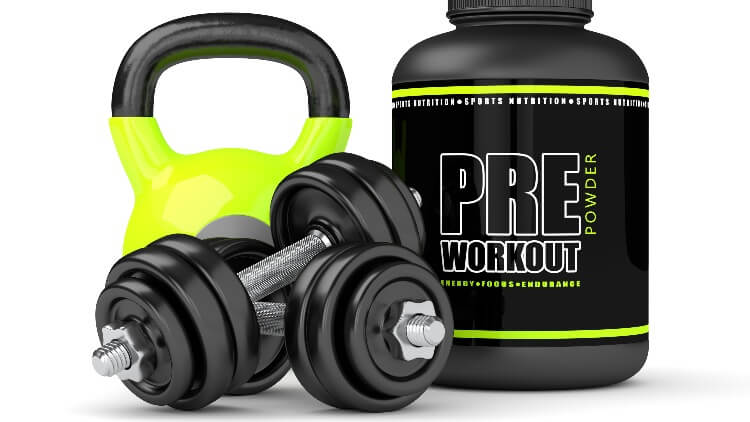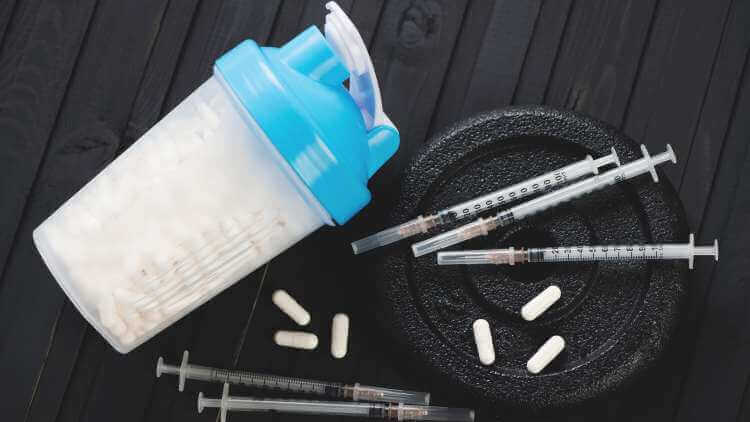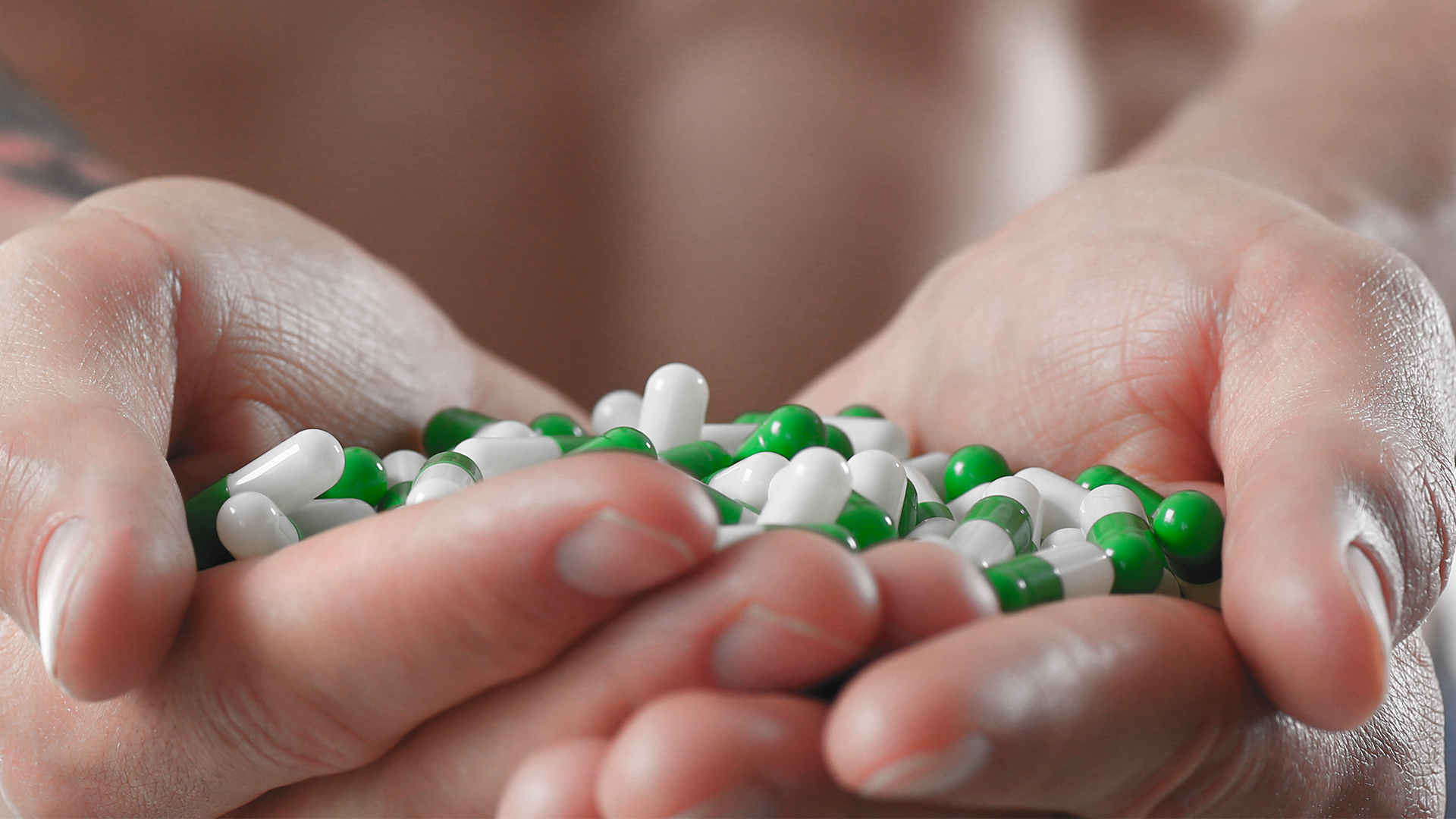DMHA has become one of the most popular pre-workout ingredients due to its reported ability to boost physical and mental energy. Is a DMHA pre-workout safe? Does it deliver on its energy-boosting promises? And is DMHA legal? Let’s find out in this DMHA review.
-
What is DMHA?
- Is DMHA Legal to Use?
- How DMHA Works
- Side Effects of Octodrine
-
DMHA Pre-Workouts
- Why is DMHA Used in Pre-Workouts?
- What Are the Popular DMHA Pre-Workouts?
- How to Take It
- What is the Cost?
- DMHA vs DMAA
- Similarities
- Differences
Pre-workout and nootropic or brain-boosting supplements have skyrocketed in popularity over the last decade. Seems like everyone needs a physical and mental boost before a tough workout or big exam. One ingredient that is finding its way into these types of supplements is also known as or.
Is DMHA DMHA a Nootropic?
Not only is it sought after for its energizing effects in the gym, but it's also gaining attention for its potential cognitive benefits. Research suggests that it can influence the release of neurotransmitters like dopamine and norepinephrine, which play a key role in long-term memory, mental focus, and overall cognitive function. This dual action—supporting both physical and mental performance—explains why it is popping up in both pre-workout formulas and nootropic blends.
What was once used as a nasal decongestant in over-the-counter medicine, DMHA (Dimethylhexylamine) has now become a staple in many pre-workout supplements. Is this a safe pre-workout ingredient to use to support performance and gains? More importantly, does it work? Let’s take a look at what is DMHA, how it works, and how it compares to DMAA.
What is DMHA?

DMHA, also known as dimethylhexylamine, is a stimulant compound that has gained attention in the supplement world. It goes by various names, including 2-aminoisoheptane and octodrine. Specifically, there are two forms of this compound:
- 2-amino-6-methylheptane
- 2-amino-5-methylheptane
The "6" form is more commonly used today because it is backed by more research and is cost-effective. It was originally developed as an indirect sympathomimetic drug to stimulate sympathetic nerves and was used as a nasal decongestant. However, users discovered its ability to enhance energy and mental alertness, making it a sought-after pre-workout ingredient.
According to the FDA, DMHA might be listed under different names in your pre-workout supplement, such as:
- 1,5-Dimethylhexylamine
- 1,5-DMHA
- 2-Heptylamine, 6-methyl-
- 2-Isooctyl amine
- Amidrine
- Vaporpac
Due to this confusion with label classification, the FDA has sent warning letters to several supplement companies.
Is DMHA (Octodrine) Naturally Derived or Synthetic?
DMHA, also known as 2-amino-6-methylheptane, is primarily synthesized in laboratories today. Initially, there was some speculation that it could be obtained from the plant. However, this plant is highly toxic and traditionally not safe for consumption, particularly since its toxins are often used for hunting.
To circumvent potential contamination or safety issues, DMHA used in supplements and products is generally created synthetically. This controlled production ensures consistency and safety for consumption.
There is another similar compound, 2-amino-5-methylheptane, which naturally occurs in the bark of the tree, commonly known as. Despite its natural origin, extracting DMHA from this source is considered economically impractical, making synthetic production the industry standard.
Understanding DMHA (Octodrine) Forms: Which is More Commonly Used?
DMHA, also known as Octodrine, is a popular stimulant found in pre-workout supplements and fat burners. It exists in multiple structural variants, but two primary forms are often discussed:
-
2-Aminoisoheptane (2-AIH): This is the 2-amino-5-methylheptane isomer, initially more prevalent in the supplement market.
-
1,5-Dimethylhexylamine (DMHA-6): Known as the "6" form, this variant has gained recent popularity due to advancements in research.
Which Form is More Commonly Used?
The 1,5-Dimethylhexylamine (DMHA-6) form is currently the more commonly used variant. Its increased usage is linked to:
-
Cost-Effectiveness: The "6" form tends to be more affordable to produce, making it an attractive option for manufacturers.
-
Regulatory Compliance: Its structure may align more closely with regulatory guidelines, steering some companies away from the older 2-AIH form.
-
Replacement Potential: It serves as an effective alternative to previous stimulants like AMP Citrate, BMPEA, and DMAA.
In conclusion, the shift towards the "6" form of DMHA is driven by cost, compliance, and its efficacy as an alternative to other banned substances.
Is DMHA Legal to Use?
As of the time this article was written, DMHA is completely legal and available for purchase online or at your local pharmacy.
However, this status is not guaranteed to stay that way. As of 2019, the is considering changing the legal status of DMHA. As mentioned above, a number of popular supplement companies have already received letters and guidelines from the concerning their DMHA-based pre-workouts. While DMHA is currently legal, we aren’t sure for how much longer, but we’ll update this article if things change.
With that said, due to reported side effects and several deaths that have been linked to supplements containing DMHA, the compound is banned by many sports authority organizations. Professional athletes and bodybuilders cannot test positive for DMHA as they may be suspended or banned from that season or competition.
International Legal Status of DMHA
-
Australia: DMHA is classified as a Schedule 10 drug, making it illegal for over-the-counter purchase since October 1st, 2017. This classification requires a security clearance prescription for possession, and importation without a permit is prohibited. They officially announced this ban, reflecting a strict stance on the substance.
-
Global Restrictions: Many countries have followed suit in banning DMHA, reflecting concerns over its safety. These international regulations contribute to an increasingly complex legal landscape for the compound.
Conclusion
While DMHA remains accessible in some regions, the global picture is rapidly changing. If you're considering using DMHA, it's crucial to stay informed about the latest legal developments both domestically and internationally. Always consult with legal resources or health professionals to ensure compliance with local laws and regulations.
Is DMHA Allowed in the Military?
When it comes to the use of DMHA in the military, things aren't always black and white. Officially, there is no universal ban on DMHA across all branches of the U.S. Military. However, policies can differ depending on the specific branch or duty station, and military regulations around supplements tend to evolve, sometimes rapidly.
It’s worth noting that many energy supplements and pre-workouts containing DMHA have been the subject of scrutiny by military authorities and organizations. The website lists DMHA as a “Do Not Use” ingredient, and military personnel may be advised to avoid products containing it.
If you are actively serving or plan to, it’s always wise to check directly with your unit’s medical officer or chain of command before using any product with DMHA or related stimulants. Policies can change, and what’s permitted today may be restricted tomorrow. Better safe than sorry—especially with your career on the line.
How DMHA Works
DMHA acts as a central nervous system stimulant that increases the uptake of dopamine and noradrenaline. Both of these compounds are neurotransmitters in the brain, and noradrenaline functions as a hormone.
As a nasal decongestant, DHMA can alleviate inflammation and swelling through the constriction of blood vessels in your sinus cavity. As a pre-workout, DMHA stimulates the release of noradrenaline, which produces the famous boosts in energy and mental alertness.
Potential Benefits of DMHA (Octodrine)
Boosting Energy Levels
DMHA, often compared to compounds like DMAA and DMBA due to its structural likeness, is believed to amplify energy levels. This stimulant effect makes it potentially beneficial for activities demanding high energy, such as intense exercise or long work hours. By possibly enhancing monoamines like dopamine and noradrenaline, DMHA may support increased motivation and energy, helping you push through your daily tasks with vigor.
Enhancing Focus and Attention
In addition to energy boosts, DMHA may play a significant role in sharpening focus and attention. This is particularly useful for those engaged in bodybuilding or weight training, where concentration can directly impact performance. With improved cognitive focus and attention, athletes might achieve more productive workouts, maintaining better form and precision throughout their routines.
Appetite Suppression for Fat Loss
For those striving for weight control, DMHA can potentially act as a strong appetite suppressant. By reducing cravings and minimizing the urge to snack, DMHA may aid in adhering to a strict diet plan, making it easier to achieve weight loss goals. However, while its appetite-suppressing properties can assist in fat loss efforts, one should approach its use with caution, especially in competitive sports, due to its structural similarities to banned substances.
Summary
While scientific studies on DMHA are limited, its potential benefits in enhancing energy, focus, and appetite control make it an intriguing option for athletes and fitness enthusiasts. It’s crucial to stay informed about regulations in sports and consider any potential risks before integrating it into your regimen.
Can DMHA Induce Feelings of Euphoria?
One of the more intriguing effects users report with DMHA is a marked sense of euphoria. This sensation is believed to occur because DMHA increases the levels and duration of key neurotransmitters—namely dopamine and noradrenaline—in the brain. By prolonging the activity of these mood-regulating chemicals, DMHA can create an elevated, upbeat mood often described as euphoria.
It's important to note that this effect varies by individual and may be influenced by factors such as dosage, sensitivity to stimulants, and whether DMHA is combined with other compounds like caffeine. While the mood lift can enhance motivation and workout enjoyment, it also underscores the need for responsible use, given the compound’s potent impact on the central nervous system.
Side Effects of Octodrine
Given its status as a stimulant, it should be no surprise that this supplement brings with it a list of potentially troublesome side effects. Studies show that these are the most common DMHA pre-workout side effects:
- Mood swings
- Concentration deficiency
- Over-stimulation
- Energy crashes
- Anxiety
- High blood pressure
- Dyspnoea
- Rapid heartbeat
- Heartburn
- Tremors
While these side effects can be found with most pre-workout stimulants, what is most troubling about DMHA is that these side effects were reported up to eight hours after ingestion.
Can DMHA Affect Sexual Function?
A common question among users is whether DMHA can cause issues like erectile dysfunction. While direct research on DMHA's effects on sexual health is limited, its stimulant nature raises potential concerns. Stimulants like DMHA can elevate blood pressure, increase anxiety, and overstimulate the nervous system—all of which may negatively impact sexual performance in some individuals.
It's important to note that side effects differ based on individual health and sensitivity. If you experience any changes in sexual function while using DMHA, it’s wise to consult with a healthcare professional. Always listen to your body and prioritize your well-being when considering any supplement.
DMHA Half-Life: How Long Does It Stay in Your System?
When considering the effects and safety profile of DMHA, it's helpful to understand how long the compound remains active in the body. Research indicates that DMHA has an estimated half-life of approximately 9 to 11 hours. This relatively long duration means the stimulant effects—ranging from heightened energy to potential side effects like rapid heartbeat or anxiety—may persist well beyond an initial dose.
The half-life is largely attributed to DMHA’s chemical structure, which closely resembles structurally similar stimulants like DMAA. This structure slows down the breakdown process in the body, allowing its stimulating influence on dopamine and noradrenaline to last for several hours after ingestion.
Because of this extended activity window, users may notice both the desired perks and the less-welcome side effects for much of the day. As always, understanding how long DMHA stays in your system can inform safer use and help gauge timing for workouts, rest, and compliance with any sporting regulations.
Understanding DMHA (Octodrine) in Supplements
DMHA, also known as Octodrine, is commonly found in two main types of supplements: pre-workout formulations and fat burners. These products are designed to enhance energy levels, improve focus, and support weight management, making DMHA a popular choice among fitness enthusiasts.
Pre-Workout Supplements
- Purpose: Boost endurance, increase energy, and sharpen mental focus during workouts.
- Usage: Typically consumed before exercise to maximize performance.
Fat Burners
- Purpose: Aid in weight loss by increasing metabolism and energy expenditure.
- Usage: Often taken to support weight management goals alongside a balanced diet and regular exercise.
Current Status of DMHA Use
The regulatory landscape for DMHA varies by region. The ingredient has been banned since October 1st, 2017. This means that its use in supplements is prohibited without a special Schedule 10 prescription. Other countries are also scrutinizing its safety and efficacy, leading to diverse regulations worldwide. Therefore, it is essential for consumers to stay updated on the legal status of DMHA in their respective areas.
Is DMHA Available in Tablet or Capsule Form?
Yes, DMHA can be found in both tablet and capsule forms, though it is typically blended with other ingredients rather than sold as a standalone product. Many popular fat burners and performance supplements on the market offer DMHA as part of their formula, often alongside other stimulants and metabolic enhancers. As with all supplement formats, it’s important to review the ingredient list and check for regulatory compliance in your country before purchasing or using these products.
DMHA Pre-Workouts
DMHA powder-based pre-workouts have exploded in popularity because of anecdotal reports from hardcore users. While DMHA is indeed available in powder form, it's important to note that you typically won't find it offered as a pure, standalone bulk powder. Instead, DMHA is most often found combined with other ingredients in pre-workout supplement blends. The market is seeing more and more products featuring DMHA as a key ingredient, but these are always formulated blends designed to maximize energy, focus, and performance for demanding training sessions.
If you’re searching for DMHA, look for it in reputable, well-formulated pre-workout powders rather than as an isolated ingredient. This approach not only ensures product safety and efficacy but also aligns with current manufacturing and regulatory practices.
Are DMHA pre-workout supplements all hype?
Why is DMHA Used in Pre-Workouts?
As mentioned above, DMHA increases the uptake of two key compounds: dopamine and noradrenaline. Both of these neurotransmitters are essential for increasing your energy levels. Here’s why:
Dopamine has been shown in studies to control motivation and a person’s desire to act. By increasing dopamine, you boost action and theoretically your performance in the gym.
Noradrenaline works side by side with adrenaline as both are released during fight-or-flight response moments where a surge in energy is needed.
Put together, these two compounds can elicit a boost in energy and motivation to get moving. This is why DMHA is popular as a pre-workout ingredient.
Enhancing Focus and Performance
Beyond just energy, DMHA contributes to sharper focus and attention, setting the stage for more effective workouts. This heightened concentration enables you to push through tough sessions with precision and determination.
Pain Threshold and Intensity
Animal studies suggest that DMHA might increase the pain threshold, potentially allowing for more intense workouts. If this translates to humans, you could experience less fatigue and a lower rate of perceived exertion, making it easier to achieve greater results.
Appetite Suppression for Fat Loss
Another notable benefit is DMHA's strong appetite-suppressing properties. This can be particularly helpful in supporting fat loss by curbing unnecessary snacking and helping you stick to your diet plan.
Caution for Competitors
While not banned outright in sports, DMHA's structural similarity to certain prohibited substances suggests caution. Athletes should be mindful of its use during competitions to stay within regulations.
By incorporating these factors, DMHA presents itself as a versatile tool in the arsenal of bodybuilders and weight trainers looking to enhance their performance and achieve their goals.
What Are the Popular DMHA Pre-Workouts?

Some of the following are considered the best-selling DMHA pre-workouts:
- Psychotic Labz: Psycho Circus
- Team Six: Stimulant-1
- Giant Sports: Giant Rush
Be aware that with supplements that offer a proprietary blend – listing the ingredient but not the dosage – you cannot tell exactly how much DMHA you are getting per serving. This could be dangerous if you’re sensitive to stimulants and the supplement contains a high dosage of DMHA.
How to Take It
Due to the stimulant status of DMHA, we highly recommend testing out a DMHA supplement at a quarter or half the recommended dosage. This will help you determine whether you’re able to handle the ingredient without risking the worst of the side effects.
Once you confirm whether or not you can handle a full serving, take as recommended, but avoid taking the supplement six to eight hours before your bedtime.
Recommended Dosage and Timing
While no official dosing recommendations exist for DMHA, a conservative safe dose based on animal studies and its similarities to DMAA is approximately 1mg per kg of body weight, up to a maximum of 160mg. It's crucial to adhere to these conservative doses to minimize potential side effects.
For optimal results, consider taking DMHA 30 to 60 minutes prior to a workout. This timing can help enhance various aspects of your training. Additionally, DMHA may be taken throughout the day as an appetite suppressant, but be mindful of the timing to avoid interference with sleep.
Safety Considerations
It's important to note that more research should be conducted on DMHA before its wider release in supplements. Until then, sticking to tested and conservative doses is the best approach to ensure safety and effectiveness.
What is the Cost?
DMHA pre-workouts can get pricey with the average cost per serving coming in at around $2.75. Expect to pay anywhere from $35 to $60 for a one-month supply, based on whether or not the supplement brand is on sale.
Can DMHA (Octodrine) Be Stacked with Other Supplements, and What Should Be Avoided?
Absolutely, DMHA, also known as Octodrine, can be combined with various supplements to amplify your training results. Here's how to make the most of it and what precautions to take.
What Supplements to Stack with DMHA
-
Training Enhancements: Boost your workout performance by stacking DMHA with protein powders, BCAAs, or creatine. These combinations can support muscle growth, recovery, and endurance.
-
Intra-Workout Stack: Incorporate DMHA into your intra-workout regime to maintain energy levels and enhance focus during training sessions.
-
Stimulant-Free Options: To avoid overstimulation, consider pairing DMHA with stimulant-free fat burners or pre-workout supplements. These allow you to enjoy the benefits without excessive stimulation.
What to Avoid
- High Stimulant Combinations: Be cautious about mixing DMHA with other high-stimulant products. This can lead to overstimulation, increasing the risk of negative side effects such as jitteriness, increased heart rate, or anxiety.
Balancing your stack appropriately maximizes the benefits of DMHA while minimizing any potential downsides. Always monitor your body's response and consult with a healthcare professional if unsure about supplement combinations.
DMHA vs DMAA
DMHA or Octodrine is often compared to another stimulant, DMAA (dimethylamylamine). This comparison raises concerns because DMAA has been banned in several countries due to its side effects. Let’s examine the similarities and differences between DMHA and DMAA.
Similarities
Chemical Structure:
DMHA and DMAA are chemically similar, which sometimes leads to them being mistakenly used interchangeably.
Uses:
Both serve as vasoconstricting agents and central nervous system stimulants. They are utilized as nasal decongestants and energy boosters in dietary supplements.
Side Effects:
Both DMHA and DMAA can cause potentially dangerous side effects, especially related to cardiovascular and psychological health.
Differences
Legal Status:
DMAA is considered an illegal substance and is not available for purchase. Testing positive for DMAA can disqualify athletes from competitions. DMHA, on the other hand, is currently legal and available, though the
Drug Testing Considerations
It's important to note that there is a very real possibility DMHA could cause a false positive result on certain drug tests. This is due to the structural similarity between DMHA and other stimulants that are included on various banned substances lists. Athletes and anyone subject to routine drug screening should exercise caution, as using DMHA may lead to unintended complications even though it is technically legal in many places. Always check the regulations of your sport or organization before using any supplement containing DMHA.
Strength:
There is no human-based study directly comparing DMHA to DMAA. However, anecdotal evidence suggests DMAA is stronger, which may explain its ban. Some DMHA users report similar effects when using the correct dosage, such as 200 mg of DMHA equating to 75 mg of DMAA.
DMHA vs DMAE
Though they may sound similar, DMHA and DMAE serve entirely different roles in the supplement world.
DMHA acts as a central nervous system stimulant. Its primary function is to increase energy, improve focus, and enhance exercise performance by ramping up the body’s release of certain neurotransmitters, which can leave you feeling more alert and ready to tackle intense workouts.
DMAE (Dimethylaminoethanol), on the other hand, is often sought after for its cognitive benefits. Unlike DMHA, DMAE isn't a stimulant. It's most commonly found in supplements that target memory, mental clarity, and overall brain health. DMAE is believed to reduce the buildup of “age pigment” in brain cells, which may help support memory and cognitive function as we age.
In summary:
- DMHA is about physical energy and workout performance—think of it as fuel for your body during demanding sessions.
- DMAE is all about supporting your mind—boosting memory, focus, and cognitive longevity.
Choosing between the two depends on your specific goals: energy for your workout (DMHA) or support for brain health and mental clarity (DMAE).
DMHA Pre-Workouts: Be Wary of Using Them
Despite the reported benefits of DMHA as an energy booster, the side effects may be more than the user bargains for. DMHA is a central nervous system stimulant and it acts by increasing the release of a fight-or-flight hormone (noradrenaline). DMHA has been shown to spike blood pressure and heart rate, which may send some users into a panic if they have prior cardiovascular-based medical issues.
There are far better energy supplements available on the market that don’t pack the same risk as DMHA, such as green tea extract and green coffee bean. We highly recommend trying a natural energy supplement and avoiding DMHA as it may be taken off the market soon anyway.
For those seeking similar effects to DMHA, there are several alternatives to consider.
Primary alternatives include:
- Teacrine: Known for its ability to enhance mental clarity and focus without the jitters.
- Dynamine: Offers quick energy boosts with a smoother onset and offset compared to other stimulants.
- Higenamine HCL: Provides a mild stimulating effect and is often used in fat burners.
If you're looking for secondary alternatives, you might explore:
- Citrus aurantium: Contains synephrine, which can mimic the effects of ephedrine.
- Hordenine: Often stacked with other stimulants for increased energy.
- Caffeine: A widely used and researched stimulant that can provide an energy kick.
- Other stimulants: There are various other compounds that can offer stimulating effects.
When considering these alternatives, it's important to know how they stack up against DMHA. For instance, DMHA is considered a more potent stimulant than caffeine. While caffeine is well-known for its quick energy spike followed by a crash, DMHA is reported to deliver a longer-lasting energy boost without the typical caffeine crash. Some users also note that DMHA offers enhanced mental function and clarity, whereas caffeine generally provides a shorter burst of energy.
These distinctions may help guide your choice, depending on what you’re looking for in a supplement—whether it’s smoother energy, improved focus, or a safer overall profile.
- .
These alternatives offer a range of options depending on your personal needs and tolerance levels. Remember, it's essential to choose supplements that align with your health goals and safety preferences.
Over 299,434 purchases
Over 509,389 bottles sold
Over 30,563,340 pills taken








